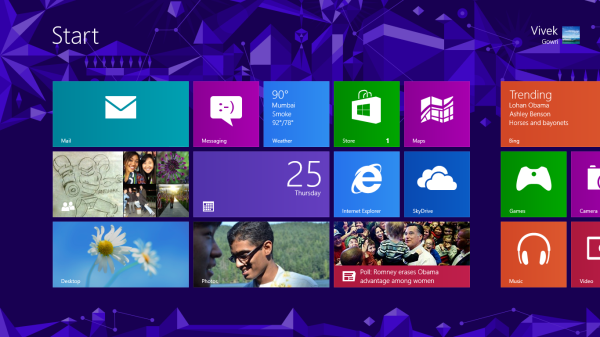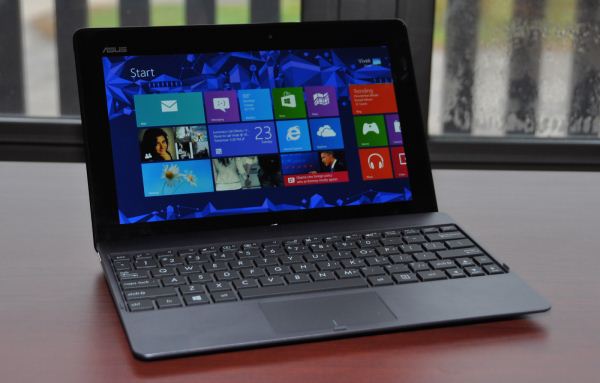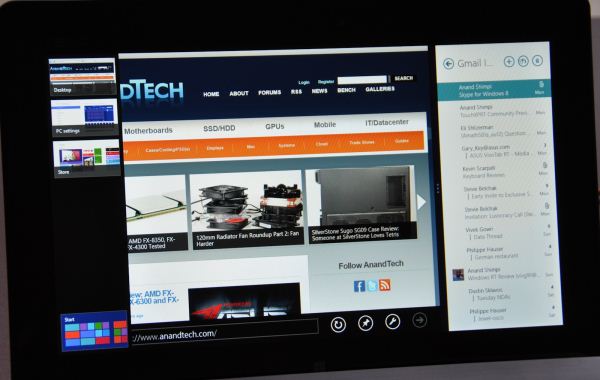The Windows RT Review
by Vivek Gowri & Anand Lal Shimpi on October 25, 2012 12:00 PM EST- Posted in
- Windows RT
- Operating Systems
- Microsoft
- Mobile
- Windows 8
- Tablets
Final Words
So, ten thousand words later, what can we take away from Windows RT? It’s definitely another superb user experience design from Microsoft. Say what you will about Windows Phone 7, but damn if that UI isn’t gorgeous. The Metro design language translates over to the tablet form factor really well, resulting in the Windows Modern UI. We’ve obviously known how Modern UI looks and feels through the various Windows 8 preview builds, but Windows RT ends up being more focused and offering a more consistent experience. It’s a side effect of being limited to apps from the Windows Store - because you spend a significant majority of your time in the new Windows UI, desktop use is minimized. In Windows RT, the Windows Desktop serves the purpose of being the more capable and powerful layer underneath the main portion of the UI, as opposed to Windows 8, which sometimes feels like the new Windows UI existing as an impractical interface layer on top of the traditional desktop.
The dichotomy just feels more comfortable in Windows RT than I feel like it has been in the previous Windows 8 systems that I’ve dealt with. It’s nice. This is the first time I feel like I’ve really connected with the new Windows UI, it makes a ton of sense to me now. I still think for mouse-based navigation, you’re better off treating it as a glorified Start menu, but it’ll be interesting to see how legacy programs affect the use of Modern UI in x86-based Windows 8 tablets as the Windows Store matures.
If you’re really concerned about the state of third-party apps, you just have to wait and see. I’ve seen a lot of snap judgements made about Windows RT in the last couple of days based on the dearth of good applications in Windows Store, and while I agree with that sentiment, I feel like it’s extremely shortsighted to write off the ecosystem already. Neither version of the OS has gone on sale yet, and we know that there are a number of applications that will go live on the official release date, as well as many more coming in the weeks ahead.
This isn’t like Windows Phone, where we need to see whether the platform will get any market traction before predicting the growth of the app marketplace. You can basically assume that the marketplace will expand significantly unless somehow everyone stops buying Windows-based systems on October 26th. The odds of that situation arising seem relatively low, so my bet is that the strength of the ecosystem will be a non-issue a month from now.
The default inclusion of Office 2013 and the emphasis on physical keyboards makes Windows RT the first tablet platform to significantly address the question of productivity. Combined with the equally advanced task switching and multitasking built into the UI, and this becomes the first legitimately useful tablet operating system out there. The Galaxy Note 10.1 wasn’t bad, but it was a single device that built additional functionality into a custom Android skin. Every single Windows RT slate comes out of the box with Office and the ability to have multiple active application windows. It’s just a few steps ahead of competing tablet platforms at this point.
And it’s not like RT loses out on a content consumption front. It’s paired with what is a very strong entertainment store and gaming franchise in Xbox Live, and the browsing experience is definitely competitive. It’s also a competent e-reader, with Amazon’s Kindle being one of the headlining apps currently in Windows Store. It even matches the power efficiency of the other ARM-based tablets, with competitive battery life and standby time. Obviously, ARM is the driving factor in the low power consumption, but it’s good to see that Windows is on a similar level as iOS and Android.
So this is a tablet platform that can do a good job of replacing both an iPad and an ultraportable in a number of different workflows. You get the best of both worlds, in some sense - Windows RT tablets have similar form factors to the iPad and leading Android tablets, and offer near-equal battery life, performance, and user experience, but they also give you the added benefit of strong productivity applications and the power of Windows Desktop. From a conceptual standpoint, almost anything you can do with an iPad can be done equally well (or close) on a Windows RT tablet, but the desktop-caliber office suite and versatile multitasking interface of Windows RT are impossible experiences to replicate on the iPad. It's not a perfect operating system by any means, but it brings a new dimension to the tablet space. So if you’re looking for a new tablet this fall, Windows RT deserves your consideration.













233 Comments
View All Comments
Flemo86 - Saturday, October 27, 2012 - link
With WindowsRT (oh God what an awful name) they're now competing with Apple on Apple's terms, and Apple have had a 5 year head start with iOS. It's just ridiculous that they have .NET, XNA, DirectX etc at such a sweet spot right now, with so many developers on board and able to program whatever the hell they want for the OS (complete with file system!), and then they just change the game entirely by tearing x86 out and putting in what may as well be an Apple chip.They should have come up with a better solution to use ALL existing software and their architectures with every device, not just the "Pro" version. That would've been real competition with the iPad. Imagine being able to port all Xbox live arcade games and every .NET application to the "Windows App Store"/Marketplace (whatever they're calling it). All Microsoft would have to do is verify each piece of software and then bada-bing bada-boom, you've got yourself tens of thousands of apps within the month, and an extremely easy set of tools for devs to use.
Of course, this would've required more effort on the hardware side. Maybe less battery life? A lower screen resolution? More effort on Intel's part? I really hope Windows RT falls by the wayside and Windows 8 Pro tablets become the de facto standard. I hate the idea of them throwing a decade worth of development tools out on one of their operating systems.
Sorry for the rant, just an XNA fan!
stimudent - Saturday, October 27, 2012 - link
Since this system uses Windows and an ARM processor instead of an Intel processor, that makes it 50% respectable. To achieve the other 50%, it would have to have Linux installed.yyrkoon - Sunday, October 28, 2012 - link
Ok, I'll bite.Whats so good about Linux ?
Polish ? Security ? painless upgrade path ? The majority of modern games played on the PC are written for this software platform ?
Or is it that you can feel good about your own self using it for free. Without having to use pirates bay ?
Seriously. Grow up.
Also, please tell me you use Ubuntu. So the rest of us can have a good laugh, and totally disregard what you have to say in the future.
B3an - Sunday, October 28, 2012 - link
That made me laugh, because it's true.foolsgambit11 - Saturday, October 27, 2012 - link
that points out that the autumn of 2000 is just before the turn of the new millenium, not just after....milkod2001 - Sunday, October 28, 2012 - link
@yyrkoonwhat's good about Linux?
lol u gotta be kidding
Android is based on Linux so iOS . That covers all Apple platform and the rest of all smartphones and tablets. Most servers are running on Linux. Not enough?
The majority of modern games played on the PC are written for this software platform ?
The majority of modern games are coded for console kids(Xbox and PS3), then ported to PC.PC games market is only the niche part of games market anyway.
Ubuntu is for geeks/scientisc/developers and not for average uneduceted joes
solipsism - Sunday, October 28, 2012 - link
"Android is based on Linux so [is] iOS."Um... double no.
Android uses the Linux kernel and some underlying code but it is not Linux in the way stimudent is talking about which is why we call it Android and not Linux or Android Linux.
iOS uses Darwin OS and foundations and frameworks found in Mac OS X. "Darwin is built around XNU, a hybrid kernel that combines the Mach 3 microkernel, various elements of BSD (including the process model, network stack, and virtual file system), and an object-oriented device driver API called I/O Kit.[6] The hybrid kernel design compromises between the flexibility of a microkernel and the performance of a monolithic kernel." All this came from NeXTSTEP and BSD before that. There is no Linux in iOS.
yyrkoon - Sunday, October 28, 2012 - link
Yeah notable features at least in my mind is that Android uses ( as standard ) A virtual machine to run each application. Kind of, but not the same as JRE..Big difference from Linux just in that. The architecture is really interesting. Despite the fact that java is the primary development language used for creating apps. Unless you choose to write native C/C++, or use a third party "scripting language". Passed that I'm sure you'd be able to write standard kernel level drivers, but yeah . . .
Mono for android is particularly interesting to me, but a bit pricey.
yyrkoon - Sunday, October 28, 2012 - link
Ubuntu is garbage.Architecturally it can be unstable, it has a very poor upgrade path track record, and they want to put google search on your desktop.
All that despite the fact that is based on one of the better distro's around IMHO. Debian.
yyrkoon - Sunday, October 28, 2012 - link
Oh and yeah to follow up on what was left out of the comments to your post.Most network admins I know that want the least bit of hassle when dealing with servers do not always opt for Linux. Just for the sake of using Linux. These people realize that an operating system is a tool, all of which have their strong and weak points. With OSX being somewhere in the middle. My post above down to the first four lines of text were pure sarcasm. With the fifth and sixth lines being tongue in cheek.
Any operating system is only as good as the user using it. It does not matter what it is. IF the user is a dumbshit, or does not care .The given OS will probably not work optimally (ever). With varying degrees of optimal operation in between, based on how well the user understands his/her operating system.
Also, we're talking computers here, not gaming consoles. With *ALL* PC games being written on some form of a PC. For the PC. Some being Linux dev machines for cross platform development, but most being Windows / visual studio developers. Ask around the game development community sometime, and ask who uses Windows / visual studio versus Linux / eclipse or some other IDE. You'll find out for yourself. This is for a good reason too. Windows / directx being the prevalent software gaming platform. For the PC. Not to mention the fact that porting games to the xbox is fairly trivial now days. Depending on the tool set you use.
"Ubuntu is for geeks/scientisc/developers and not for average uneduceted joes"
Uh yeah . . . I think this "sentence" speaks for its self.